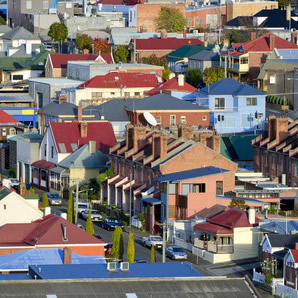Australian property still ‘not booming’

SQM Research figures show that the number of Australian residential property sale listings fell during April in most capital cities.
Nationally, the number of listed properties fell to 347,966 in April 2015 – down 2.8 per cent from March and 0.1 per cent from a year earlier, according to SQM.
“Sydney and to a lesser extent Canberra recorded the heaviest monthly falls, as a result weighing down the national average. Year-on-year results indicate that Sydney, Melbourne and Hobart experienced excessive yearly falls,” SQM said.
Melbourne recorded the biggest yearly change, with listings down by 18.2 per cent to 36,479. Sydney’s listings are down 13.7 per cent on this time last year and Hobart recorded a fall of 8.4 per cent. Canberra’s downturn “appears to be over, with year-on-year figures showing a modest change of 4.6 per cent”..
SQM managing director Louis Christopher said agents would be “desperate for new listings” and noted that Perth and Darwin are “clearly in a downturn with too much supply and not enough demand”.
In addition, he said the figures are at odds with popular commentary around Australia’s property market.
“These numbers clearly illustrate there is no national housing boom,” Mr Christopher said. “But clearly, the Sydney market has become the ‘problem child’ for the RBA and it looks like Melbourne is now heading that way as well.”
Mr Christopher noted asking prices are continuing to rise in Sydney (climbing 1.4 per cent to a median of $1,080,000 for houses and 2.7 per cent to $609,600 for units) and Melbourne (up 4.2 per cent for houses and 1.7 per cent for units), but said the picture wasn’t consistent across the country.
“In contrast, median asking house prices in Darwin continue to fall with year-on-year comparison showing a 12-month decline of 3.5 per cent. Perth also recorded house asking prices declines in the month of 3.1 per cent,” SQM said.
Mr Christopher said yesterday’s rate cut would have a “varied impact” on the housing market, but that it was unlikely it would end the downturns in Perth and Darwin.
“The impact of the severe commodities downturn far outweighs the rate cut, although I am sure without the rate cuts in this cycle, existing property owners would be in a far worse situation than they have on their hands now.”
He said there was “no question” the cash rate reduction would stimulate the east coast property markets even further.